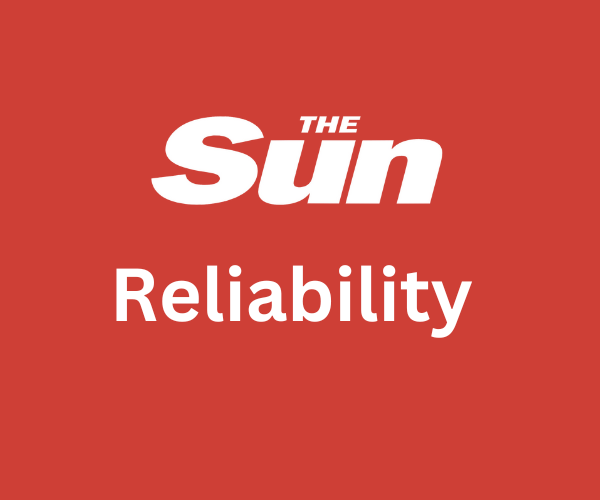
The Sun is one of the UK’s most popular news websites, in close competition with Daily Mail. See Daily Mail eclipses the Sun to become UK’s top-selling paper and Audience data: Sun claims top spot as UK’s most widely read commercial newsbrand, whose subheading claims: “The Sun ahead of the Daily Mail in latest Pamco readership figures.”
However, despite its popularity, The Sun is actually one of the least-trusted newspapers in the UK according to a survey by YouGov. To put a number on this, only 6% of Britains surveyed said they trusted The Sun, as opposed to the 44% of Britains who stated that they trusted BBC, a fact which proposes an interesting conundrum.
If so few people trust The Sun, why is it so popular? Is the public’s view of The Sun’s reliability accurate? In this article, we’ll investigate The Sun’s credibility through an analysis of their articles and bias.
Does Reliability Matter?
Reliability, in general, refers to how trustworthy or accurate information, or in this case, a news source is. If we consider this definition, it quickly becomes clear why reliability is important in media sources. If we can’t trust the things we read then there isn’t much of a point in continuing to consume content from that source, after all. So how exactly can we gauge the reliability of a news source anyways?
There are several potential measures of reliability to look out for when trying to determine whether a media source is reliable or not. Red flags for an unreliable article can include the presence of wild unsubstantiated claims, facts dependent on other unreliable sources, heavy use of opinionated language, and more. Some indicators of a reliable news source, on the other hand, include things like:
- Absence of subjective/opinionated language in articles
- Credible sources cited (e.g., neutral sources, .gov, .edu websites)
- Facts and statistics backed by multiple relevant outside sources
- Use of primary sources when possible (e.g., interviews, quotes)
- Information that remains consistent across news sources
So, How Reliable is The Sun? The Numbers.
Biasly looks at many different media sources, politicians, policies, and articles and gives each of them a bias and a reliability rating. The Sun has a reliability rating of Fair, according to Biasly’s AI, and a reliability rating of Good, according to its analysts, on par with the NY Times’ Fair and Good ratings, respectively. However, The Sun is not quite as reliable as sources such as the Wall Street Journal, which has an analyst reliability rating of Excellent.
The Sun Accuracy and Reliability: Article Analysis
Reliability is not as simple as fact-checking an article. Few sources, especially those as popular as The Sun, will include false information deliberately. Instead, misinformation often appears in the form of selection and omission bias, and can often be subconscious.
Selection bias is when stories and facts are selected or deselected, often on ideological grounds, to create a narrative in support of the new sources’ ideology. Omission bias, on the other hand, is when different opinions and political views regarding a situation are left out so that the reader is only exposed to the ideological perspective supported by the author. It’s important to keep in mind these two types of biases when trying to assess an article’s level of accuracy.
As mentioned before, Biasly rates articles on the presence of bias and on reliability. Reliability scores are given on a scale of 1-100, with one representing unreliable reporting and a hundred representing reliable reporting. These scores are calculated using the number of sources cited in each article, their lengths, the variety of sources included, and other factors.
The Sun has a reliability rating of Fair, meaning that it is neither reliable nor completely unreliable. However, this score will vary from article to article, influenced by factors such as selection and omission bias. In general, the more bias that is present, the less reliable an article will be, but this isn’t always the case.
The Jewish Press, for instance, holds an overall reliability rating of Fair and a bias rating of Moderately Conservative, but its articles vary widely in reliability. Former Vice President Mike Pence Joins GOP Presidential Race, for instance, which was given a bias rating of Center, has a reliability rating of Fair, whereas Netanyahu Demands Guterres Change UN’s Negative Attitude Toward Israel, which is Very Conservative, has a reliability rating of Poor. This pattern also shows up in The Sun’s articles.
While more centrist articles such as Cops told to throw book at anti-Israel protesters ahead of mass demo, which received a rating of Center-Left, have reliability ratings of Fair, Good, or even Excellent, articles such as Fury as HS2 bosses blow money on inclusivity guide as cost could hit £180b, which has a bias rating of 28%, or Moderately Conservative, are unreliable. This article, for instance, received a reliability rating on the lower end of the range covered by the denomination “Fair.”
In the article, Sabey discusses High Speed 2, a company that plans to cover 140 miles with zero carbon output. The company has been known for the large amounts of money they spend and wasted due to mismanagement and other issues. He criticizes them for their efforts to increase diversity and inclusivity, subtly blaming these new policies for the growing costs.
Sabey frequently places information about the amount of money being spent on HS2 next to news on their new diversity programs:
“HS2 bosses blow your money on woke inclusivity guide as cost of project could hit eye-watering £180 billion”
“PM Rishi Sunak is said to be alarmed by the escalating costs of the project — which have already hit £91 billion despite being originally set at £30 billion — and is considering cancelling part of it. HS2 staff’s training sessions aimed to ‘help facilitate internal conversation and greater understanding of unconscious bias’”
“Lord Berkeley, a Labour peer who served on a government review into the scheme, said its full cost was ‘nearer £180 billion’. HS2 Ltd said: ‘It’s vital we set high standards to ensure everyone is able to work in a safe and supportive environment.’”
By doing so, Sabey implies that the new diversity programs are to blame for the ever-rising costs. This is a form of selection bias. By deliberately selecting pieces of information and placing them in a specific manner, Sabey influences readers’ perceptions without actually providing any information on how much the diversity programs cost. Without that information, we cannot draw any conclusions about the programs, positive or negative.
We’ll take a closer look at The Sun’s articles and their reliability below.
Reliability in The Sun Opinion Pieces
Opinion pieces, or op-eds, as they are commonly known, allow for reporters to state their opinions while still reporting in a journalistic manner. These articles are more likely to be biased, and thus less likely to be reliable, but are still an important part of reporting due to their ability to showcase different perspectives and the facts supporting each side.
We’ll look at the quality of the sources used in The Sun’s op-eds, as well as the presence of omission and selection bias to conclude The Sun’s op-eds’ reliability.
Quality of Sources and Facts Used
While The Sun often uses statistics and sometimes includes accurate information, it only ever cites itself. All hyperlinks in The Sun’s articles point right back to itself. For instance, take a look at the following citations from Taxpayers forking out £20,000 a day to keep MPs warm in crumbling Houses of Parliament:
“Taxpayers forked out £7.1m last year to cover gas and electricity bills on the crumbling Parliamentary Estate.”
“But while politicians in parliament are insulated from the soaring price of energy, constituents face bills at record levels, leaving many unable to heat their homes or put enough food on the table this winter.”
Traditionally, such hyperlinks would point towards the source of the information included in the article, or at least contextualize any topics that may not be well-known. However, in this case, the hyperlink for “bills” actually just points towards the topic “bills” in The Sun’s articles, showcasing a page where all articles about bills are displayed. The second quote is no better. The hyperlink for “winter” doesn’t lead to any source discussing this winter or how the citizens of the UK are dealing with food shortages. Instead, the hyperlink takes you to The Sun’s page on all articles dealing with winter. This page doesn’t even actually exist and instead redirects the reader to https://www.thesun.co.uk/fabulous/, the fashion and beauty segment of The Sun.
In this article, The Sun doesn’t list any of its sources makes it hard to tell exactly how reliable its sources are, simultaneously casting doubt onto The Sun’s reliability itself.
Selection and Omission Bias
The Sun also has a great deal of selection and omission bias. Consider There is no love out there for Sir Keir Starmer, whose title itself is statistically false as Starmer is still in the lead in YouGov polls over who would be the best prime minister. The rest of the article selectively includes information supporting the title’s claim and omits any that does not support it, resulting in a less reliable article.
Smith says that:
“He served in Jeremy’s shadow cabinet – even as many of his colleagues refused to. He failed to publicly speak out and criticize the Labour leadership as the vile scourge of anti-Semitism ripped through the party. He was the one who tried to call a second referendum on Brexit to defy the choice of the British public, yet now he says he has changed his mind.”
These statements are intended to support his claim that Starmer is unpopular in the UK, yet do not directly assess his popularity, only his actions. The author seems to intend for the reader to assume that because of these actions, he is not popular, which doesn’t align well. The author could have used more sources from both sides of the aisle to avoid selection and omission bias.
In addition, these claims are not completely reliable either. He calls Brexit “the choice of the British public,” failing to provide contextualization by mentioning that a majority of British citizens believe Brexit was the wrong choice according to a survey by YouGov.
The article’s lack of reliability seems to stem from the author’s bias. By including sentences such as “It is time for the Conservatives to get our fight back,” and “Labour, now made up of green zealots,” the author allows their bias to integrate into the article, which also affects their journalistic neutrality which in turn affects their quality of sources, selection bias, and omission bias.
The source mentioned in the previous section, Taxpayers forking out £20,000 a day to keep MPs warm in crumbling Houses of Parliament, on the other hand, despite a lack of citations, seems to have little selection or omission bias. In discussing the issue of heating the Houses of Parliament, the author does not seem to have any political agenda and thus includes all of the relevant information, leaving little out.
So while opinion pieces are more likely to be biased and lack accuracy, this is not always the case. However, considering that The Sun has a conservative and centrist readership, it is more likely to pander to its audience and write articles with a slight conservative bias, so it is important to be on the lookout for the presence of bias and selection or omission bias.
So, Is The Sun Reliable?
The Sun is a news source with an average amount of reliability. While people may think it is reliable due to how well-known and how popular it is, it is just as reliable as most other moderate-sized news sources and does not hold the same degree of accuracy as, for instance, the New York Times. For more information regarding The Sun and the bias and reliability of recent articles, you can visit Biasly’s page on The Sun.


























